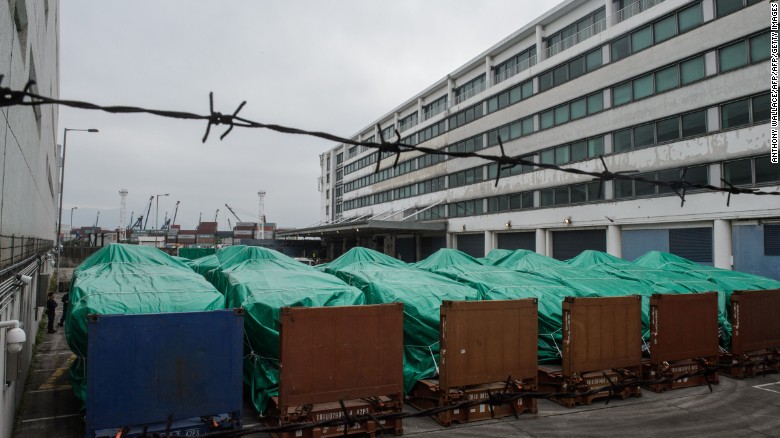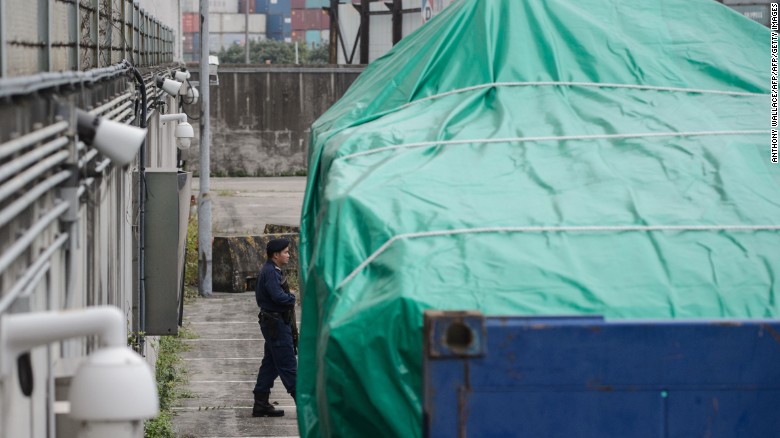China is sending message to Singapore lighten up on the talk of "international law". Global Times with their hyperbole even talk about melting those APC in one of China steel mill. And inglorious end to Terrex.
GT Diatribe
. Read the comment section interesting from this guy with handle name Yes
Kind of strange because China has known it for years and tolerated it.I guess they are unhappy with overt support for FON, international law, basing of PC3 etc. The relation will change. If I were China I will cozy up to Malaysia. Open an efficient and cheap port in Melacca.Sell them first class weapon.
shower i with investment which they already did. Malaysia is better bet than Indonesia
From CNN
Troop carriers seized: Is China sending Singapore a message?
By
, CNN
Updated 4:06 AM ET, Tue November 29, 2016
Armored vehicles belonging to the Singapore military seen covered with tarpaulin in Hong Kong.
Story highlights
- Singapore defense chief says overseas training not secret
- A team from the Singapore Armed Forces has been allowed to inspect the vehicles
- Analysts says seizure could be way for China to indicate its displeasure
(CNN)Singapore is scrambling to recover nine armored troop carriers that have been impounded in Hong Kong for almost a week after they were used in a military training exercise in Taiwan.
Singapore's Ministry of Defence
of Terrex infantry carriers had been delayed on November 23 during a routine inspection by Hong Kong Customs.
have suggested the seizure was at Beijing's request.
It certainly earned Singapore a unusual public reprimand from China.
"China opposes any country with which it has established diplomatic ties from conducting any official exchanges, including military, and cooperation with Taiwan. We urge the Singapore government to keep its promise to the One China principle," Geng Shuang, a spokesman for Ministry of Foreign Affairs said Wednesday.
Singapore's defense ministry said the vehicles were used "in routine overseas training and shipped back via commercial means as with previous exercises" and no ammunition was on board. A Singapore Armed Forces team has been allowed to inspect the vehicles,
"Our training overseas has never been secret. People know where we train, openly," Defense Minister Ng Eng Hen said Tuesday.
He added that Singapore had played a positive role in improving cross-strait relations between China and Taiwan.
Analysts say the seizure of the military vehicles may be designed to send a message to Singapore.
Teaching Singapore a lesson?
Zhang Baohui, a professor of political science at Hong Kong's Lingnan University, said that Singapore had a long-standing defense ties with Taiwan and has often used the island for training drills given a lack of space in the crowded city state.
"I don't think that China has given Singapore a public rebuke for this before," Zhang said. "I think the real issue is that China thinks Singapore has turned into a quasi US ally."
"In the context of deteriorating relations, it could be a Chinese strategy to teach Singapore a lesson and a way to indicate their unhappiness," he added.
Singapore has strengthened military ties with the US and taken a tough stance on the South China Sea dispute, urging China to abide by an international tribunal that ruled its claims to the waters were unlawful, said Zhang.
It's also been a strong advocate of the Trans Pacific Partnership (TPP) trade deal,
, and China's Global Times newspaper has been
with the Singapore government.
Taiwan's defense ministry declined to comment, saying the troop carriers didn't belong to its military.
Singapore's Ng said that hoped the reasons for the vehicles' seizure would be made clear after a meeting Tuesday between Hong Kong officials and the commercial shipping carrier APL.
Hong Kong's Customs and Excise Department said the case is under investigation.
Role model?
Singapore has long played a mediator position in confrontations between China and Taiwan, which are divided by decades of tension after separating in 1949, and
between their leaders last year.
What's more, Singapore, with its brand of government-led capitalism, has also been held up as a role model in China, especially under Lee Kuan Yew, whose vision was said to have inspired
But Yvonne Chiu, an assistant professor at Hong Kong University, says that China's relationship with Singapore has soured -- just as other Asian neighbors like the
and
appear to be pivoting away from the US to Beijing.
"Singapore prides itself on its rule of law and its place in the international community and this complicates China's interests and what happens in its sphere of influence," she said.
Chiu added that Beijing was also likely sending a warning signal to Taiwan's new President Tsai Ing-wen, who is from a traditionally pro-independence party.
Tsai is trying to lessen Taiwan's economic reliance on China and develop stronger ties with southeast Asian countries -- under a "go south" policy. Singapore is the only southeast Asian country to
"It seems like Beijing is starting to feel it needs to be more heavy handed and nip these things in the bud," said Chiu.
CNN's Rebecca Wright in Hong Kong and Serena Dong in Beijing contributed to this report


